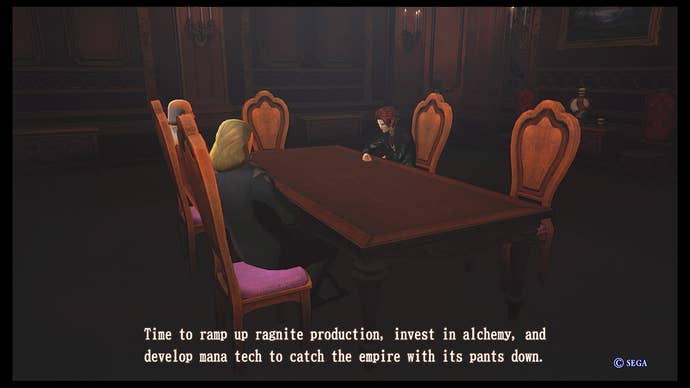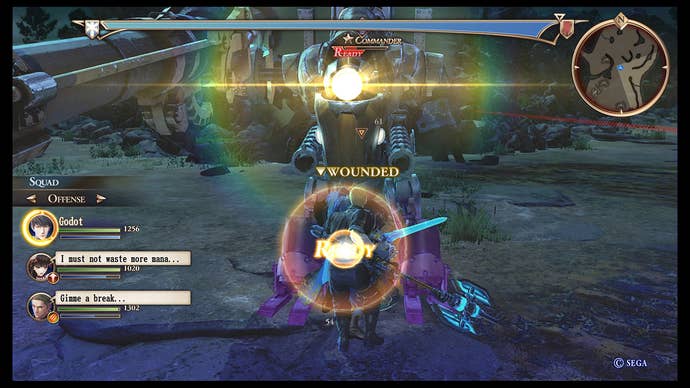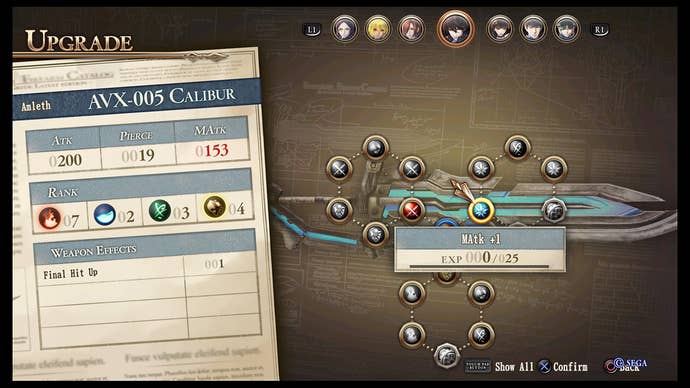Valkyria Revolution Review: War Crimes
Sega's Valkyria Chronicles revival is a disappointment.
This article first appeared on USgamer, a partner publication of VG247. Some content, such as this article, has been migrated to VG247 for posterity after USgamer's closure - but it has not been edited or further vetted by the VG247 team.
When I was in high school, I would spend hours and days writing primers for nations, races, and worlds that didn't exist. As a fantasy and sci-fi nut, I was less enthralled by characters than the world they inhabited. Valkyria Revolution, paralyzingly dull as it is, brings me back to those days—the days when I was more concerned with world-building than actual storytelling.
It reminds me of the Star Wars prequels, actually—in particular the bits where they're talking politics in the Imperial Senate chambers. Valkyria Revolution's characters mercifully avoid discussing taxation of trade routes, but their conversations about politics and strategy are no less interminable. Like the prequels, Valkyria Revolution brackets mindless battles with long, drawn out discussions about politics and strategy.
In many respects, it's the exact opposite of its predecessor—the much-loved Valkyria Chronicles. Where Valkyria Chronicles was about a squad of ordinary people banding together and fighting for their home (with some supernatural help), Valkyria Revolution is about kings and politicians deciding the fate of nations. Where Valkyria Chronicles was based around turn-based strategy, Valkyria Revolution is an action game. They share a name and a little bit of the lore, but otherwise the similarities between the two are mostly cosmetic.

Valkyria Revolution's centers around the struggle of a small nation named Jutland's struggle to throw off the yoke of imperial oppression, which is masterminded by a handful of shadowy business leaders and politicians called "The Traitors." Their military arm is led by Amleth—your typical sullen anime protagonist with a dark past, and Ophelia, the princess of Jutland. His squad, which is your only real glimpse of the Jutland military, consists of the usual array of one-note anime archetypes, from the Klutzy But Cute Girl to The Grizzled Veteran. These characters are occasionally highlighted in optional conversations, but otherwise the spotlight is firmly on Amleth, Ophelia, and the rest of the Traitors.
In what might be Valkyria Revolution's most interesting touch, the story is framed as an academic discussion between a professor and her student. Between battles, the two question the motives of the Traitors with the benefit of hindsight. Like the rest of the game, these scenes come off as dry, academic, and frankly kind of boring, but they have the benefit of adding an extra layer to the storytelling. It suggests that the story isn't 100 percent onboard with the actions of the Traitors—an underlying story thread that gets teased whenever the scene shifts back to the professor.
As the story progresses chapter by chapter, the narrative shifts from the professor, to the various discussions between the Traitors, to the main hub—a bustling marketplace where you can upgrade your weapons, catch up on a limited amount of news, and craft new items. The actual battles exist as missions, which you can select at the local headquarters.
Much of Valkyria Revolution is spent watching the Traitors come up with their next plan; discuss their strategy at length, and then talk about how they're going to execute it. Occasionally the scene shifts over to the Ruz Empire, Jutland's main antagonist, where we see the Emperor Klaudiusz laying down plans of his own. There is very little in the way of actual characterization, save when Ophelia worries about how a royal should engage with their people, or when Amleth broods about his past and his desire for revenge. The very few moments of levity, such as the first scene where Amleth actually cracks a smile, are a rare breath of air.

From Tactics to Action
Valkyria Revolution's dry, academic tone is at odds with its depiction of the actual battlefield. Far from featuring actual tactics, Valkyria Revolution's battles are more akin to Dynasty Warriors: hack, slash, and hack some more.
Most of these missions are in the vein of "kill everything that moves." There is a very limited stealth mechanic—a holdover, I suspect, from the original Valkyria Chronicles—but it tends to take a backseat to running around and slashing your way through packs of enemy soldiers.
To that end, you and your three party members are furnished with a larger number of weapons, including powerful grenades, a rifle, and a melee weapon. But aside from your sword, your most reliable means of combat are your Ragnite abilities—powerful elemental spells that deal large amounts of area damage. Up to four Ragnite abilities can be equipped at any time, though there are restrictions on class and elemental level.
It's a fundamentally sound system, I suppose; but like the rest of the game, the actual combat tends to be repetitive and boring. You're rarely in danger when fighting actual enemies, as generous mana regeneration and revival mechanics allow you to heal off pretty much any damage you receive. Battles are less a matter of skill than a matter of patience as you grind your way through hordes of enemies in a series of non-descript bases and forests.
This format rarely varies even in major story missions. Sure, you might be split away from the rest of your party, or forced to use a group of characters outside of your normal rotation, but the basics are the same. It only changes when you fight the odd boss, in which case victory is a matter of pure attrition.
It's all pretty brainless and one-dimensional in any case; and while there's something relaxing about blowing up a dozen soldiers with one grenade, the repetition of it all gets pretty old after a while. I found it almost exhausting to play without a podcast playing in the background to distract me, but that wound up depriving me of Yasunori Mitsuda's excellent soundtrack—one of Revolution's few saving graces. Decisions, decisions.
In all honesty, it's actually kind of hard to sum up everything that Valkyria Revolution does wrong in a reasonable number of words. So I guess I'll try and hit a bunch of them here:
- The weird skill tree. I had no idea what was going on with the skill tree until I figured out that I had to 'sell' surplus Ragnite to unlock stat boosts. It's an awkward and unwieldy system, and the fact that it takes multiple Ragnite spells to unlock one boost makes upgrading multiple party members slow going.
- The system where you can set A.I. priorities is a mess. You have offensive, defensive, and support commands, but it's unclear how these settings affect your party in battle. Likewise, the mechanisms for prioritizing certain abilities are really murky. I mostly picked the abilities I wanted and hoped for the best. In the end, I wound up taking manual control quite a bit because I couldn't trust my party to support me when I needed it.
- The multiple shops scattered around the main hub area makes crafting armor kind of a pain, as you have to run around buying the materials you need from different stalls. Moreover, the actual crafting is pretty limited. You can get new jackets, boots, and ammo pouches with various boosts, but the combat is so easy that it's rarely worth the hassle.
- There are all kinds of mechanics that don't really seem to go anywhere. The aforementioned stealth mechanics, for instance, which are so flimsy that its hard to say why they exist at all. You can also select "side battles" in which you are ostensibly influencing the outcome of the war, but it's unclear how these are any different from the regular free missions.
- There's a lot of obvious filler. Some of the story missions, for example, are pitched as extremely simple "weapons testing" levels where you complete a very simple objective. You also fight several of the same bosses more than once, and their encounters almost never change.
- It's so poorly paced. Standard missions will take maybe 10 to 15 minutes to complete, then everything will grind to a halt as you're subjected to one conference room discussion after another.
- It's pretty limited from a visual standpoint. The painterly graphical filter does little obscure how basic the actual textures and character models are. I'd go as far as to say that the original Valkyria Chronicles, which came out back in 2007, looks quite a bit better. That's a major disappointment for a series that was once known as one of the best-looking games on the PS3.

Outside of Mitsuda's aforementioned soundtrack, it's hard to peg one thing that Valkyria Revolution does really well. Probably the nicest thing I can say about it is that it's not offensively bad, and can even be sort of enjoyable in short bursts. Mindless as it is, carving my way through hordes of enemy soldiers has a certain element appeal to it.
But that's also damning it with faint praise. Valkyria Revolution's biggest problem is that it's really boring—a sin that manifests in almost every phase of the game. I'm sure someone will be able to engage with it; but even as an avowed history junkie, I found it dull in the extreme.
As always, even the smartest political drama can fail to land if it lacks strong characterization. In the end, Valkyria Revolution lacks both of those things.
InterfaceThe UI is all over the place with this game. The menus are poorly organized, and there's no unified hub for the customization options, which makes them hard to track. It winds up badly hurting the RPG aspect as a whole.
SoundYasunori Mitsuda of Chrono Trigger fame provides a robust soundtrack, which particularly stands out during the battles. The voice acting ranges from average to grating.
VisualsSharp, angular character models and bland textures undermine Valkyria Revolution's otherwise attractive cel-shading. It honestly looks and feels like a game that's straight out of the PS3 era, which I suspect is a compromise that allows it to run on the Vita.
ConclusionValkyria Revolution tries valiantly to weave a tale of political intrigue, but it's undermined by repetitive mission design, poor menus, and an anonymous cast. If you were hoping for a worthy successor to Valkyria Chronicles, you will be sadly disappointed.

